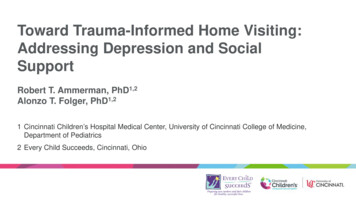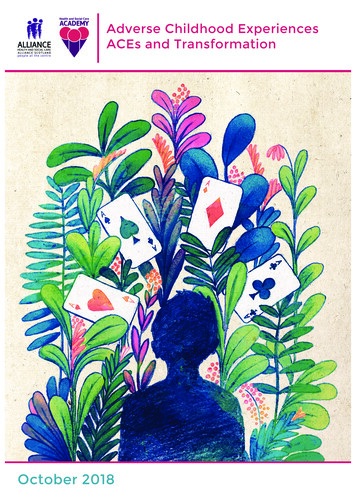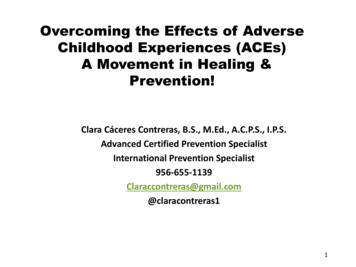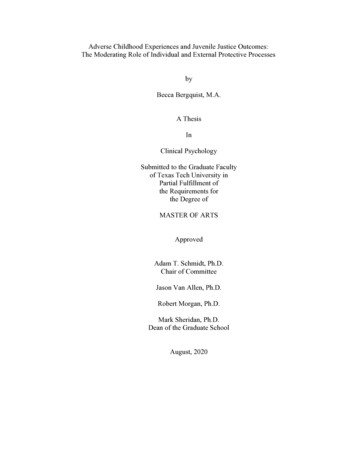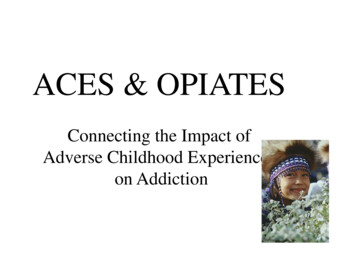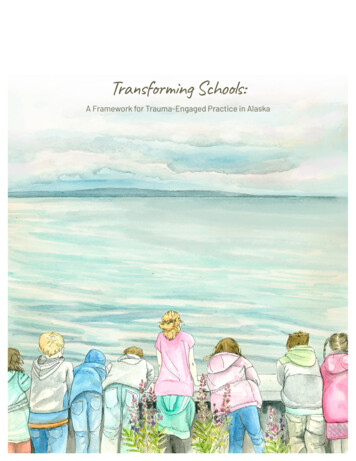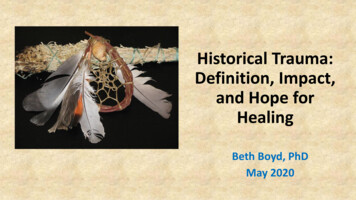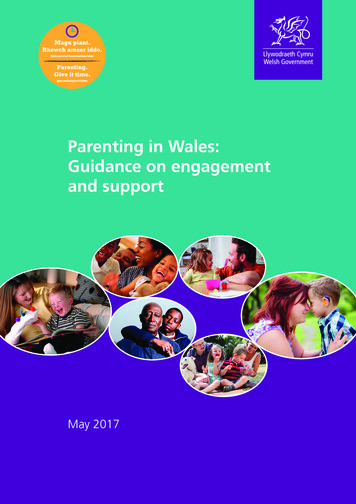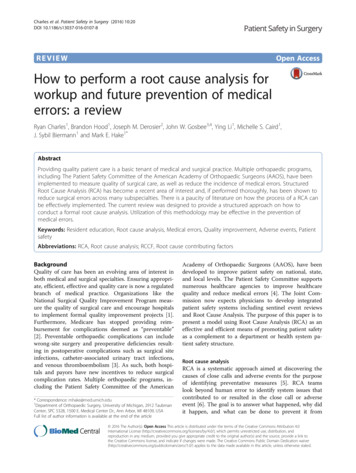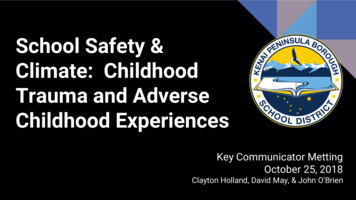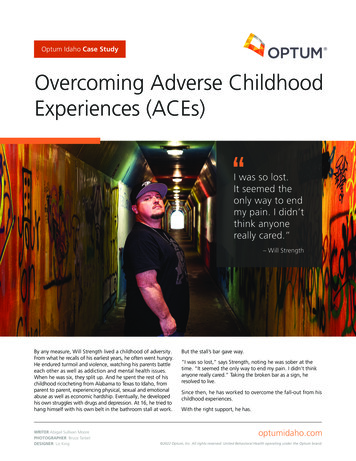
Transcription
Optum Idaho Case StudyOvercoming Adverse ChildhoodExperiences (ACEs)I was so lost.It seemed theonly way to endmy pain. I didn’tthink anyonereally cared.”– Will StrengthBy any measure, Will Strength lived a childhood of adversity.From what he recalls of his earliest years, he often went hungry.He endured turmoil and violence, watching his parents battleeach other as well as addiction and mental health issues.When he was six, they split up. And he spent the rest of hischildhood ricocheting from Alabama to Texas to Idaho, fromparent to parent, experiencing physical, sexual and emotionalabuse as well as economic hardship. Eventually, he developedhis own struggles with drugs and depression. At 16, he tried tohang himself with his own belt in the bathroom stall at work.WRITER Abigail Sullivan MoorePHOTOGRAPHER Bruce TarbetDESIGNER Liz KingBut the stall’s bar gave way.“I was so lost,” says Strength, noting he was sober at thetime. “It seemed the only way to end my pain. I didn’t thinkanyone really cared.” Taking the broken bar as a sign, heresolved to live.Since then, he has worked to overcome the fall-out from hischildhood experiences.With the right support, he has.optumidaho.com 2022 Optum, Inc. All rights reserved. United Behavioral Health operating under the Optum brand.
Overcoming Adverse Childhood Experiences (ACEs)Adverse childhood experiences range from sexual, physicaland emotional abuse to physical and emotional neglect to ahost of other hardships that children can face at home: Violence or threats against a mother or stepmotherby a father or boyfriendA household or family member’s struggle with drugabuse or mental illnessSeparation from a parent, most typically by divorceor incarcerationThe growing number of parents—and grandparents—dying fromCOVID-19 is creating a new adverse childhood experience forchildren under their care. In Idaho, this new group of COVIDorphans is estimated to number at least 500. Before the Deltasurge arrived in Idaho, researchers estimated that about 497children in the state had lost their primary caregivers due to thevirus.1“Like COVID-19, ACEs can affect all socio-economic groups,’says Dr. Dennis Woody, a pediatric neuropsychologist andsenior clinical program consultant for Optum Idaho. Whena family has limited resources and endures homelessness andhunger, the risks for negative impacts from these adverseexperiences rises, he notes.Will Strength’s childhood checks the box for every traumaticexperience, plus the lack of resources and financial stability.Potential Consequences of ACEsThe consequences of ACEs can be profound, harming a child’simmediate and long-term mental and physical wellbeing,studies show.Optum Idaho Case StudyWhen children undergo such trauma on a chronic basis—andwithout the support of caring adult—they develop a toxic level ofstress. Enduring racism and community violence worsens it.The toxic stress overloads the body’s normal stress responses,harming developing systems. Especially during early childhood,this dysfunction can affect the brain’s architecture, lesseningneural connections for self-control, learning and planning andamplifying similar connections for fear, anxiety and impulsiveresponses. 2Toxic stress can lead to physical problems later in life. Peoplewith ACEs are at higher risk for chronic health problems—heart disease, diabetes, cancer, asthma and other immunesystem disorders. They also are more likely to experiencemental illness, substance abuse, suicide and impaired abilityto concentrate and make decisions.5of the top 10leading causes of death areassociated with ACEs3(respiratory and heart disease, cancer, diabetes, suicide)“Without intervention, children with ACEs tend to stalldevelopmentally, and are less likely to develop a sense oftrust and hope, motivation or purpose, competence, andeven a sense of self,” says Dr. Chris Streeter, an adolescentand child psychiatrist who sees hundreds of young patientswith ACEs annually at St. Luke’s Children’s Center forNeurobehavioral Medicine in Boise.The greater the number of ACEs that people have, the greatertheir risk for these impairments.Effects of trauma on a childwithout the support of a caring adultOverloadof normalstressresponseToxicStressbegins tobuild2 Developingsystemsharmedin the bodyDecrease of neural connectionsfor self-control, learning andplanningIncrease in connections forfear, anxiety and impulsiveresponsesRiskincreasesfor chronicillness/issuesas an adultIncreased risk of heart disease,diabetes, cancer, asthma andimmune system disorders, as wellas higher risk for depression,mental illness, substance abuse,suicide and impaired ability toconcentrate and make decisions. 2022 Optum, Inc. All rights reserved. United Behavioral Health operating under the Optum brand.
Overcoming Adverse Childhood Experiences (ACEs)Optum Idaho Case StudyACEs are preventable. And, even though early intervention isbetter, with support healing can occur even years later in life.“Everyone has the potential to recover and that’s not beingPollyanna,” says Streeter.ACEs in IdahoResearch shows that ACES are far more prevalent in Idaho thanin many other states, with troubling, far-reaching effects.Sponsored by Optum Idaho, the managed care contractor forthe Idaho Behavioral Health Plan through the Idaho Departmentof Health and Welfare’s Division of Medicaid, a 2018 surveyfound that almost one in four Idaho adults reported four ormore ACEs—a threshold amount for long-term physical andmental health impacts.Follow-up research revealed that adults with four or more ACEsled far more difficult lives than their peers with no ACEs. Theywere more likely to have lower incomes, be unemployedand have dropped out of high school. They also were far morelikely to have asthma, other lung disease and visionimpairments. And they reported greater rates ofdepression and difficulties with memory, focus anddecision-making. 4A 2016 survey of Idaho’s children is concerning.Nearly one in four had two or more ACEs—a proportion higher than the nationalaverage. Most striking—13.4 percent hadNearlyEveryone hasthe potentialto recover, andthat’s not beingPollyanna.”– Dr. Chris Streeterlived with someone who was mentally ill, suicidal or severelydepressed—versus the national average of 7.8 percent.5 Thedata hints at what social scientists already know—withoutintervention, ACEs can pass from generation to generation.Recognizing the Impact,Spreading the WordThe research that Optum supported is part of its ongoingeffort to help Idahoans, especially children, affected by ACEs.ACEs Idaho adultsexperienced in childhood 41 in 4Idahoansreported4 or more ACEs 4Emotional abusePhysical abuse4According to a 2018 survey sponsored by Optum Idaho.(37.6%)(19.2%)Sexual abuse(13.9%)Parental divorce or separation23.4(31.7%)Household member struggling with alcohol(26.6%)Household member who had mental illness(23.4%)%of children in Idaho hadtwo or more ACEs**Without intervention, ACEs can passfrom generation to generation.(higher than the national average)5According to a 2016 survey.3 2022 Optum, Inc. All rights reserved. United Behavioral Health operating under the Optum brand.
Overcoming Adverse Childhood Experiences (ACEs)“More than half of the people we work to serve and that ourproviders serve are children,” explains Executive Director ofOptum Idaho Georganne Benjamin.For the past several years, Optum Idaho has been helpingtrain behavioral health care providers that work with youngchildren and their parents to address these traumas. It alsohas partnered with schools to provide on-site clinicians to helpstudents in need—most with multiple ACEs. Optum Idahoalso has worked to create awareness about ACEs across thestate. Several years ago, it brought the critically acclaimeddocumentary about ACEs, “Paper Tigers,” to communitiesthroughout Idaho. The moving documentary shows how aWalla Walla, Washington high school helped its studentsrecover from childhood traumas.Knowing that a documentary featuring Idahoans wouldresonate more deeply in the Gem State, Optum Idahoco-sponsored the recently released documentary “ResilientIdaho: Hope Lives Here” www.idahoptv.org/shows/specials/resilience/ that tells the inspiring stories of individualsin Idaho who have overcome the ACEs in their lives.Benjamin hopes “Resilient Idaho” sparks conversationsamong everyday Idahoans about childhood traumas andremoves any stigma associated with getting help to healfrom them. “A lot of people don’t really realize how theyhave been impacted,” she says. They need to hear amessage of hope and help, observes Benjamin: “It’s OK.You didn’t do anything. There is help for you. We canwork through this. You’re not alone.”Determined to keep the conversationgoing, Optum Idaho partnered in May2021 with the Idaho Resilience Project,a new network of organizationsthat address ACEs across a spectrumof family services, to deliver 7,000“Kites for Hope” to communitiesacross Idaho. The kites symbolizedthe power of positive experiences forchildren. The project is now working toshift how communities view childrenaffected by ACEs, Benjamin says, from“what’s wrong with these kids towhat happened to these kids.”In Idaho, this change is critical.“Recognizing the impact of the ACESis so massively huge because it canchange the way that people respondto those kids,” says Roger Sherman,executive director of Idaho Children’sTrust Fund, a nonprofit working toprevent abuse and neglect amongIdaho’s children and project member.He points to how understanding ACEshas transformed Idaho’s juvenile4 Optum Idaho Case Studyjustice system over the past decade. (See ‘Juvenile JusticeSytem’ story on page 7).“These kids can’t control what happened to them. But wesure can help and create a pathway for them to the future,”says the project’s leader, Jean Mutchie, community healthmanager at St. Luke’s Health System and a Nampa CityCouncil Member.Now, a movement to build that path forward is gainingtraction across Idaho. The documentary is helping fuel interestin community-based solutions—from building resiliency tosupporting preventive programs to creating new public policy.“This is our story now and it’s not somebody else’s story,”explains Sherman.SolutionsEven though ACEs can have severe effects, research showsseveral factors can help mitigate them. Among those factors,helping children learn to regulate their emotions and formpositive social connections can help, as can fostering parentingskills and resiliency among young, at-risk families.Perhaps, most important of all is the influence of a stable,caring adult.Helping Children RegulateEmotions and Form ConnectionsOther than home, school is where children spend most oftheir time, making it a prime platform to help students withACEs as well as their families.A lot of peopledon’t really realizehow they havebeen impacted.They need to heara message of hopeand help. ‘It’s OK.You didn’t doanything. There ishelp for you. We canwork through this.You’re not alone.’”Before dropping out of high school,Will Strength attended 13 schoolsover 10 years, building a transcript ofmediocre grades even as he acted outto get attention. Despite everything,school was his refuge. “As horriblyas I did, school was my break, myescape. I had a hot meal andsomeone I could ask who wasn’tgoing to judge me.”In Idaho, an effort to train teachershow to help students like Strengthmore effectively is rippling slowlyacross the state, from Coeur d’Alene,Nampa, Pocatello and districts inbetween.The training gives teachers a newlens to view students with chronic,disruptive behavior issues. “Honestly,we talk about ACEs so that adultssay, ‘That is important and incrediblyimpactful and maybe that is why aOptum, Inc. Allrights reserved. United Behavioral Health operating under the Optum brand.– 2022GeorganneBenjamin
Overcoming Adverse Childhood Experiences (ACEs)Optum Idaho Case StudyWe want a self-regulatedlittle individual who alsocan function later at work.”– Heather Yarbroughstudent is struggling,’” says Keith Orchard, mental healthspecialist for the Coeur d’Alene district, who leads the effort.The training also shows teachers new techniques to connectwith students and to nudge their behavior in a positivedirection. “Kids do better when they feel safe and are in arelationship,” he says.At Endeavor Elementary school in Nampa, where most studentsqualify for free or reduced lunches, several years of traininghave wrought change—large and small.“Flip My Lid” gesture“Chill Out Zone”As teachers reframed their notions of students with ACEs,they also shifted how they handled behaviors of all students—not just those with trauma. Now, along with reading andwriting, children learn how to manage their emotions. Whenstudents become frustrated and emotional, they make a “flipmy lid” gesture: thumb tucked in, fingers curled to resemblethe human brain. In every classroom, comforting “chill outzones” have replaced time-out corners. The zones are equippedwith coloring books, fidget toys and bright posters aboutcommon emotions. In these spaces, children practice calmingexercises, counting to 10 and tracing the fingers on theirhands, rebooting emotionally for their return to learning.Children can use the same skills outside the classroom andlater in life, says Heather Yarbrough, Endeavor’s principal. “Wewant a self-regulated little individual who also can functionlater at work,” she says. For children who need more adultattention, teachers dispense it in two-minute conversationsthroughout the day.Now, teachers feel more empowered, she says. They also feelcalmer. “Before we were trying to own so much—you heartheir circumstances, the bruises, the sleep deprived kiddo.”Now, teachers believe they have helped their students to havesome control in their lives, she says. And children, with orwithout ACEs, become more socially and emotionally competentafter practicing how to regulate emotions.Fostering Parenting Skillsand ResiliencyQuality preschool programs and home visitation programs thattrain parents of at-risk families and connect them to vitalresources helps reduce ACEs.6 The Idaho Resilience Projectand other ACEs experts are advocating for greater investmentin Idaho’s preschools and home visitation programs like HollyWhitworth’s.5 2022 Optum, Inc. All rights reserved. United Behavioral Health operating under the Optum brand.
Overcoming Adverse Childhood Experiences (ACEs)Whitworth, who works at Eastern Idaho Public Health providingthe Parents as Teachers services, has spent 17 years visitingthe homes of vulnerable families with young children. Theparents tend to be young, unemployed and unable to putenough food on the table. Having multiple ACEs themselves,they are now facing the fall-out of substance abuse, depressionand anxiety. And they all share the same wish: “I want it tobe better for my child than it was for me,” says Whitworth.To break the cycle, Whitworth teaches her clients how toparent, showing them simple activities to help bond and buildtrust with their children. “It’s games. It’s down on the floor.It’s talking. It’s singing,” she says. She also works with parentsto help regulate their own emotions—a skill they can passalong to their children.Whitworth supports parents in other ways—pursuing jobopportunities, finding food banks, referring their childrenwith developmental delays for early intervention servicesand connecting them to other key supports. The goal is tohelp the parents build resiliency—the capacity internally andexternally—to weather life’s storms.Optum Idaho Case Studytrust in the counseling process, he says. Head Start alsoprovided other practical support: fuel vouchers that enabledStrength to secure a part-time job, which soon became afull-time job. With Head Start’s help, Strength earned his highschool equivalency degree. Strength’s life improved. “I wasactually able to hold down a job, stopped going to jail, stoppeddrinking, stopped smoking weed and getting into fights,”he says. His family’s life improved, too. With the agency’sguidance, his wife who already had a college degree, forged anew path at college, enabling her to teach at Head Start.“Within five years of being at Head Start, we got off foodstamps and public housing, and our life wasWill Strength’son a serious uptick,” he says.grade school photo.A Stable, Caring AdultResearch shows that a caring adult—amentor—can make all the differencefor a child with ACEs. Typical mentorsare teachers, coaches or counselors.She did her best. I don’tknow if she remembers whatshe represented in my life.”One day he hopes to tell her:“You saved my life.”– Will StrengthFor Will Strength, a Head Start preschool program for hisdaughter in Pocatello helped break the generational chain.It also helped heal him.At 21, he was at a crossroads. Married and father of a threeyear-old, Strength was unemployed, living in public-assistedhousing and still battling bad habits. His wife, the family’sbreadwinner, was threatening to leave him. Then, theyenrolled their daughter into Head Start, and their life beganto change. A family advocate coaxed Strength with free pizzainto a father’s program. That course soon led to others there.“I learned fathering skills and took parenting classes andcounseling,” says Strength. The biggest step was building6 A fourth-grade teacher in Pocatello took Strength under herwing, giving him sandwiches and pizza after school. Whenshe saw bruises on him, the authorities intervened. Strengthrelocated temporarily to a safer environment, but it was outof the school district and away from his caring teacher. “Shedid her best,” Strength recalls. Now working for the Pocatelloschool system, he sometimes spots her from afar. “I don’tknow if she remembers what she represented in my life,” hesays. One day, he hopes to tell her: “You saved my life.”Sometimes, mentors appear in unexpected places, as SeanBlackwell, an instructor of criminal justice and sociology at theCollege of Idaho, found. 2022 Optum, Inc. All rights reserved. United Behavioral Health operating under the Optum brand.
Optum Idaho Case StudyOvercoming Adverse Childhood Experiences (ACEs)JuvenileJustice SystemOver the years, thousands of troubled adolescentsand children appeared before Magistrate Judge MarkIngram in Idaho’s Fifth Judicial District to account fortheir actions. “I would ask, ‘Why did you do that?”he recalls. “They would legitimately say, ‘I don’t know.’They just have these emotional outbursts that theycan’t control.” Learning about Adverse ChildhoodExperiences and how they influence behavior helpedanswer Ingram’s question. “It explains so much ofwhat we encounter,” says Ingram, who also chairsthe Juvenile Justice Advisory Committee for the IdahoSupreme Court.Shannon McGuireData shows that adolescents in Idaho’s detentioncenters have far more ACEs than their peers in thegeneral population.92.2%As a child, Blackwell survived a gauntlet of ACEs. Notsurprisingly, he acted out at school and was even expelled.For years, he lacked a stable, caring mentor in his life. Butwhen he was 14, a sympathetic relative from Texas invitedhim to spend summers there. He went to work for his relative’sfriend, “Uncle Rich,” the owner of a power-washing business.Blackwell spent hours with him, driving the backroads, powerwashing bank lanes and restriping parking lot lines in the Texasheat. “He saw me for all my humanity and brokenness andpotential. Without any formal training, he saw who I couldbe,” recalls Blackwell. “He was one of the only people whocould identify what I went through and say, ‘That’s messedup.’” Over time, Blackwell came to trust him, seeking his advice.“He would just say, ‘That’s stupid. You shouldn’t do that.’And I would listen to him. He’s the reason I have a relationshipwith my mother.” Now, Blackwell is married, a father of fourand a college instructor pursuing his Ph.D. at the University ofLeicester (UK), a complement to his Master’s degree from theprestigious London School of Economics. Blackwell is evergrateful to Uncle Rich and his compassionate relative.“I think mentors are everything,” he says.The power of mentors can be long lasting. Shannon McGuireovercame multiple ACEs to become a successful, communityminded entrepreneur in Idaho. She credits caring teachers forproviding vital inspiration later in life. A gifted student, McGuirehad dropped out of high school to get a job. At 17, shebecame pregnant and unable to support herself. She fell backon the words of her teachers. “They reinforced the power of7 of teens in Idaho detentionfacilities have ACEs7(54% of Idaho teens in the general population have ACEs)Girls in detention have a higherACE count than male peers 75.19vs2.88Ingram says recognition of ACEs and their impact onyouths in the justice system has grown substantiallyamong his colleagues, prosecutors, probation officersand other related staff. The collective understandingis that the youths’ traumas need to be treated to helpshift their behavior. That knowledge has createdremarkable change. In lieu of punitive programs,about half of youthful offenders are now referred tobehavioral health resources in their communities,following a standard risk assessment. In some counties,(Story continued on next page.) 2022 Optum, Inc. All rights reserved. United Behavioral Health operating under the Optum brand.
Overcoming Adverse Childhood Experiences (ACEs)education,” she says. Inspired, she earned her high schooldiploma at 20 and enrolled in college. “Those conversationsstill stay with me.”Adults with ACEs alsoBenefit From MentorsOptum Idaho Case StudyJuvenile Justice System(continued)At the Head Start program in Pocatello, Will Strength’s familyadvocate encouraged him every step of his journey. Eventually,she became like a second mom to him. “I could spill all myworries and insecurities to her,” he says, wondering today at39 how to express his gratitude to her.probation employees monitor their progress; inothers, community boards staffed by volunteerskeep tabs. Though mentoring programs are offeredin some areas, counseling, substance abuse treatmentand meaningful community service are the staples.Facing ACEsOver the past several years, the number of youthsin residential detention centers also has decreasedsignificantly.Strength finally learned about ACEs at age 36. He took a test,asking how many of the listed adverse childhood experienceshe had undergone. All, he answered. His score was a revelationand a relief. “I bawled like a baby. It opened up my eyes abouthow far I have come and how far I have to go.” On occasion,he still struggles, but serving others keeps him moving forward.On a personal level, Ingram says learning aboutACEs has changed how he interacts with families inhis courtroom. He is more attuned to their parents’needs. “They lived through their own series of abusesand bad experiences,” he says. As for the youth, hisessential question has evolved, too.Now, he is a mentor to other young adults, many workingthrough the impact of their own difficult childhoods. He foundedDad Speak, an organization that counsels and encourages fathersto become fully involved with their children and in theircommunities.Now, he asks “How do you feel?” As head mechanic in the Pocatello school district’s groundsdepartment, Strength is close to earning his college degree inpolitical science and social work. To help families on a broaderlevel, he dreams of running for political office. Meanwhile,he finds joy in his family and their achievements. His wife isa special education teacher; his oldest daughter, a collegeThe Powerof MentorsAs a young child, Luis Granados did not feel safe nor protected.He saw his father assault his mother. And, Luis was beaten, too.Emotionally abused, he also was left alone with his siblings forhours as their parents labored, six days a week at a meatpacking plant. School provided little respite. As a MexicanAmerican, he endured bullying and racism. Growinghypervigilant and aggressive, he eventually joined a gang.At 17, he dropped out of high school.For a time, he found acceptance and support through acommunity program, the Original Gangsters Basic Academy ofstudent; his youngest, editor-in-chief of her high schoolnewspaper. He and his wife also recently adopted two youngsons of a relative who was in and out of prison. Each night,Strength reads “Harry Potter” books to them, determined togive them the stability and love that he lacked as a child.“I am very happy with my life,” he says. Development (OGBAD) in Nampa, Idaho. Academy mentorshelped him. They celebrated his GED, assisted with his resumeand drove him to his job at the city’s parks department wherehe never missed a day of work. Still, he connected with hisgang again. Unwittingly, he sold a gun to a gang member,who then used it in a robbery. That sale landed Granados inprison, horrified and terrified at where life had taken him.Just 19, he was now facing 15 years behind bars.In court, Granados listened to the prosecutor’s grim assessmentof him and his future. “I was just a gang member, pretty mucha lost cause,” he recalls. He was devastated: “Is that what thecommunity really thinks about me? Is that who I really am?”For six months, he waited for his sentencing in a small cell,sometimes contemplating suicide. As his sentencing dateneared, a hardened cellmate warned Granados not to share(Story continued on next page.)8 2022 Optum, Inc. All rights reserved. United Behavioral Health operating under the Optum brand.
Overcoming Adverse Childhood Experiences (ACEs)Optum Idaho Case StudyI remember starting to cry.It was the first time in a longtime that somebody mademe feel kind of human—made me feel like I wasstill a person.”– Luis GranadosThe Power of Mentors (continued)his childhood experiences with a presentencing investigator.But when the investigator was kind to him, expressing surpriseat his youth, Granados did. “I remember starting to cry. It wasthe first time in a long time that somebody made me feel kindof human—made me feel like I was still a person.”The investigator noted his GED, work experience and supportsystem of mentors and other academy resources. And at hissentencing, he took ownership for what he did. He addressedthe judge: “I told her that I wasn’t a lost cause. I had dreamsand goals. My dreams were to work.” He described his strongwork ethic and his pride in maintaining Nampa’s parks andcontributing to the community.Maintaining his mental health is an ongoing priority. “I see atherapist every week and have joined men’s circles about healthymasculinity. It’s done wonders for me,” he says, noting theloving relationship that he enjoys with his life partner and twodaughters. Recognizing the fall-out from his ACEs has broughtGranados a measure of peace. “I’m not crazy. I’m not alone.”He hopes the Optum Idaho co-sponsored documentary,“Resilient Idaho: Hope Lives Here” www.idahoptv.org/shows/specials/resilience will spread awareness aboutACEs—even in the school systems. Some days, when theturmoil in his life prevented him from sleeping, he fellasleep at his desk. “When I put my head down, instead ofgetting kicked out of class if they could have asked me whatwas wrong. That could have helped.” It is the question thathe now asks each youth at Breaking Chains Academy. The judge gave him a second chance—six more months inprison, followed by seven years of probation. During that time,he worked hard to satisfy his probation requirements. Sevenyears later, appearing before the same judge for his final time,change was evident. Dressed nicely and with a positive attitude,Granados was now employed at OGBAD’s successor—thenonprofit Breaking Chains Academy of Developmentwww.breakingchainsacademy.com teaching and mentoringother youth in need. “I remember her smiling and lookingover to the prosecutor and asking if there were any objections.There were none.”Now the academy’s executive director, Granados credits thementors for his turnaround. “They were the one trusted adultin my life. I am still in contact with them.” At Breaking Chains,he has found a deeper redemption. “Working with the kidshas taught me to love myself and forgive myself for thingsthat have I done.”9 2022 Optum, Inc. All rights reserved. United Behavioral Health operating under the Optum brand.
Overcoming Adverse Childhood Experiences (ACEs)Optum Idaho Case StudySources1 “COVID-19-Associated Orphanhood and Caregiver Death in the United States,” Susan D. Hillis, Alexandra Blenkinsop, Andrés Villaveces,Francis B. Annor, Leandris Liburd, Greta M. Massetti, Zewditu Demissie, James A. Mercy, Charles A. Nelson, Lucie Cluver, Seth Flaxman,Lorraine Sherr, Christl A. Donnelly, Oliver Ratmann and H. Juliette T. Unwin Pediatrics October 2021, e2021053760; onal Scientific Council on the Developing Child. (2005/2014). Excessive Stress Disrupts the Architecture of the Developing Brain: WorkingPaper 3. Updated Edition. http://www.developingchild.harvard.edu 2005, 2009, 2014, National Scientific Council on the Developing Child,Center on the Developing Child at Harvard ice, M. Adverse Childhood Experiences (ACEs) among Idaho Adults, 2018.Boise, ID: Idaho Department of Health and Welfare, ntingACES.pdf7Lynch, S.M. & Weber, S. (February 4, 2020) District VI 2016-2018 Detained Youth & ACES: Preliminary Findings 2020. Idaho StateUniversity aho-citizens/# ednref3CreditsWith a background in national journalism and executive and corporate communications, Abigail Sullivan Moore is a writer specializing inbehavioral health issues. She lives in Connecticut.Bruce Tarbet is a Boise-based professional photographer specializing in travel, fine art and portraits
Adverse childhood experiences range from sexual, physical and emotional abuse to physical and emotional neglect to a host of other hardships that children can face at home: Violence or threats against a mother or stepmother by a father or boyfriend A household or family member's struggle with drug abuse or mental illness
